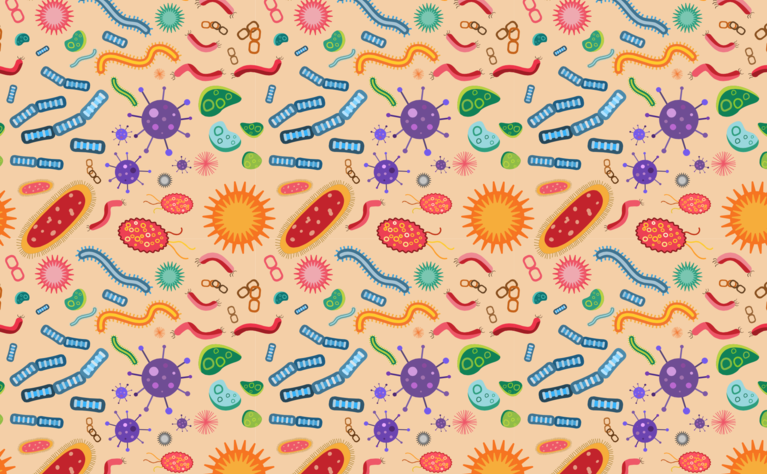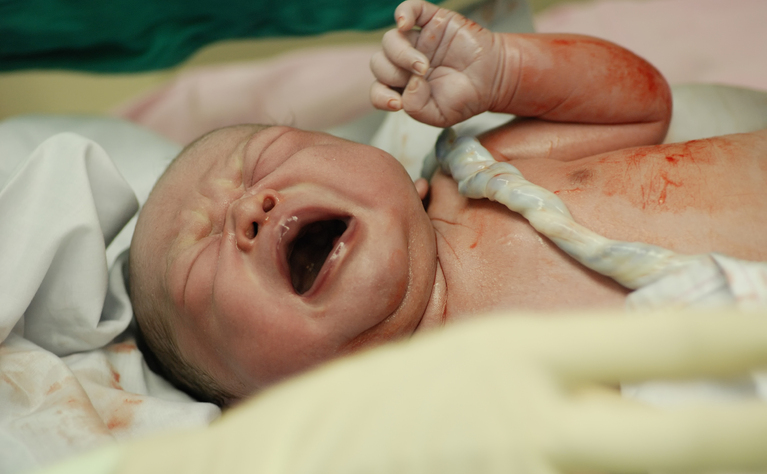
Do you know what gut health or the microbiome are or how they might relate to IBD? Find out more in this article.
We have the same number of microbes (i.e. bacteria, fungi and yeast) in our guts as we do cells in our body1 and it’s these microbes that make up our gut microbiome. Most of the microbes in our gut live in our large intestine (colon) but microbes also inhabit other parts of our intestines. Every part of our body has microbes living in or on it (even our skin). Each of these separate colonies of microbes around our body are known as microbiota.
The majority of these microbes are beneficial and they help us to digest food, such as vegetables, which we wouldn’t be able to digest without them, provide energy for our metabolism, make essential vitamins and act as the first line of defence against germs.
There are some bacteria that can have negative effects on our health and the health of our microbiota but the other bacteria in our bodies help to stop these ones from having ill effects on us. In fact, many of our microbes work together and need each other to help support the health of our gut.
The number and balance of the microbes in our intestines can change daily and even from meal to meal. New bacteria enters our body and develops and others leave or die off. And, no two people’s microbiomes are the same - not even identical twins.
It is thought we have around 500-1000 different types of microbes in our bodies - totalling trillions.
Researchers are still figuring out exactly how our microbiome works and grows but it is believed that just before you are born your body is sterile. During the process of birth you pick up bacteria in the vaginal canal which starts to populate your body and create your microbiome. In your early days breastfeeding assists in helping your microbiome to grow.
But, a vaginal birth is not always possible and having a caesarian section exposes you to skin bacteria, creating a very different type of microbiome from a baby who is born vaginally2. Babies who are not breastfed are also exposed to a different set of bacteria to those who are.
As we grow and develop during our first few years we are exposed to a lot of different bacteria in our environments - around the house, outside of the home and from other people and animals. All of this bacteria assists in adding to your microbiome and it is the first few years of our lives in which it grows and develops the most3. Some people believe we now create an environment that is too sterile through over cleaning and sterilising and children are not being exposed to the bacteria which gives them as diverse microbiome as they would have received just a few generations ago.
As you move from childhood to adolescence and then to adulthood your microbiome continues to develop - though the biggest development phase takes place in your early years.
There are also some things which are thought to negatively affect your microbiome - taking antibiotics, poor diet, stress, poor sleep, and other environmental factors are believed to contribute to damaging your microbiome. Scientists are now linking these changes to the development of chronic diseases, other health conditions and changes in mental health.
So far, we know from the research that the more diverse our microbiome the better for our health4.

The role the microbiome plays is wide-reaching and essential to our survival. We are only just beginning to really understand the roles it plays.
Some of its main functions include protecting us from bacteria that cause disease, regulating our immune system and breaking down our food to absorb nutrients. It also produces vitamins (including B12, thiamine, riboflavin and K) and has an influence over whether we are fat or thin, affects our overall health and contributes to our rate of ageing.
An imbalance of the gut microbiota is known as dysbiosis. Dysbiosis may play a role in causing and/or contributing to many diseases, including some beyond the digestive system5. These diseases and conditions include irritable bowel syndrome, inflammatory bowel disease, neonatal necrotizing enterocolitis, gastrointestinal (GI) cancers, asthma, allergy, and infectious diseases, Parkinson’s Disease, Alzheimer’s disease, cancer, obesity and diabetes5.
The role gut health and our microbiome plays in IBD is an area being researched more and more. It is becoming increasingly accepted that intestinal dysbiosis (an imbalance of the gut microbiota) is found in people with IBD6,7,8. However, it is not yet understood if this is a cause or a consequence of IBD and more research into this area is being carried out. These changes to the gut microbiota may be allowing disease-promoting bacteria to thrive instead. Again, this is an area that more research is being carried out into.
Recent research has found there to be some success in inducing remission in ulcerative colitis patients through the use of faecal microbiota transplants - or FMT transplants. In simple terms FMT is the process of taking faeces from a healthy donor, extracting the beneficial intestinal bacteria and yeasts from it and then transplanting it into the colon of a recipient. It is also sometimes referred to as a stool transplant. Read more about FMT.
To get your microbiome tested a sample of your poo needs to be sent off to a lab and analysed to see what microbes are found. Comprehensive microbiome testing isn't currently available on the NHS in the UK; only testing for specific things is offered.
If you want to find out the make up of your microbiome then you will need to pay a private company to do this for you. This service is now becoming more accessible to the general public and companies such as Healthpath offer gut health tests* to take a look at the bacteria in your gut and analyse how your digestive is working. These companies also often provide recommendations for how you positively support your own gut health.
Our modern lifestyles mean that we often do things that damage our microbiome without even realising. Being more aware of some of these things means we can try to reduce them, and in turn reduce the harm to our microbiome. These include:
To help support the diversity of our microbiome we should try to limit as much of the list above as possible. Some particularly good things we could do include cutting down on sugar, increasing the diversity of the plant foods we eat (research shows that regularly eating 30 or more plant foods a week leads to a more diverse microbiome than eating 10 or fewer plant foods per week), drinking plenty of water to stay hydrated, reducing stress, eating fermented or ‘probiotic’ foods and, in some cases, it may be appropriate to take probiotic supplements.
*Please note this is an affiliate link which means if you buy from the company we may receive a commission. You will pay the same price and any commission gained will be used to support IBDrelief's work